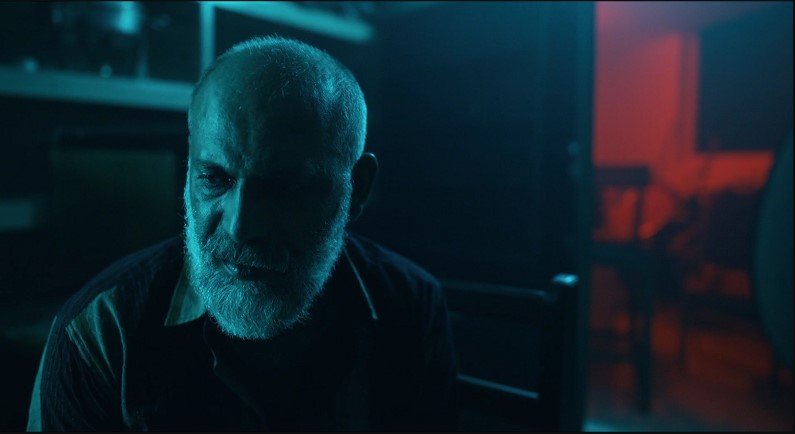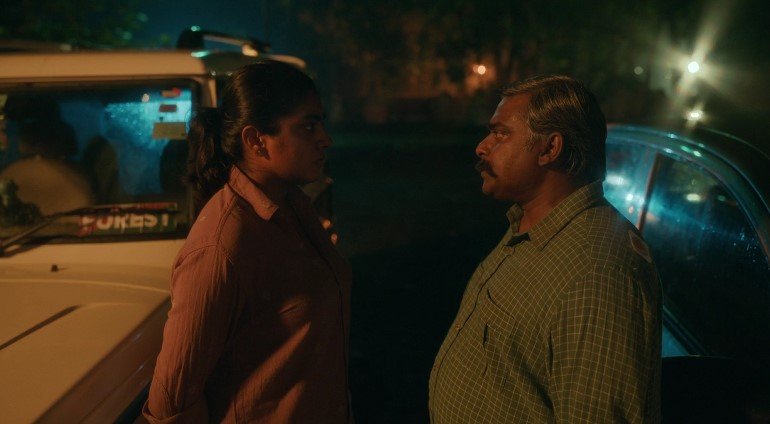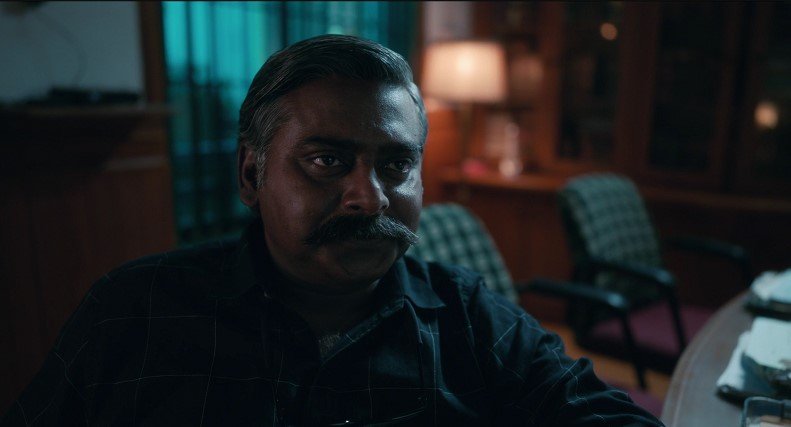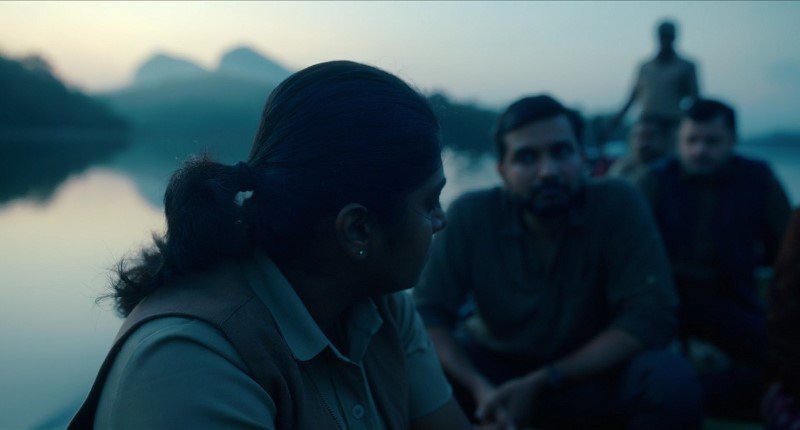Poacher Story:-
The opening scene of ‘Poacher’ shocks viewers with the grim image of a slain elephant, setting the tone for an unflinching portrayal throughout the eight-part series. The brutal reality of poaching is laid bare as majestic creatures are callously slaughtered for their tusks, leaving no room for compassion from the hunters. Witnessing the extraction of tusks and the ensuing bloodshed evokes a visceral response of disgust and anger.
Movie Ratings
| Release Date | 23 February 2024 |
| Language | Malayalam |
| Genre | Crime, Drama |
| Episodes | 8 |
| Creator | Richie Mehta |
| Cast | Nimisha Sajayan, Roshan Mathew, Dibyendu Bhattacharya, Ankith Madhav, Kani Kusruti, Sooraj Pops, Sanoop Dinesh, Ranjitha Menon |
| Director | Richie Mehta |
| Writer | Richie Mehta |
| Cinematography | Johan Heurlin Aidt |
| Music | Andrew Lockington |
| Producer | Alia Bhatt, Edward H. Hamm Jr., Raymond Mansfield, Sean McKittrick, Richie Mehta |
| Production | Eternal Sunshine Productions, Poor Man’s Productions Ltd., Production Scope, QC Entertainment, Suitable Pictures |
| Certificate | A |
In 1991, hunting was outlawed in India under an amendment to the Wildlife Act. However, in 1995, a poacher’s guilty conscience led to the discovery of a vast elephant poaching network in Kerala, with connections reaching dangerous criminal organizations like the Triads.
Writer-director Richie Mehta, known for his work on the Emmy-winning ‘Delhi Crime’, demonstrates meticulous research in depicting the intricate web of poaching operations. The series unveils layers of complicity spanning across the nation, underscoring the pervasive nature of the crime. The authenticity of the narrative is upheld by the choice of cast, with Malayalam-speaking actors such as Nimisha Sajayan, Roshan Mathew, and Kani Kusruti delivering compelling performances.
Sajayan portrays Mala, a forest officer haunted by her family’s hunting legacy and driven by a desire to rectify past wrongs. Mathew’s character, Alan, utilizes meticulous analysis of telephone records to piece together crucial information, while Dibyendu’s Neel navigates the perilous path of righteousness despite his own mortality.
‘Poacher’ offers a gripping exploration of the relentless pursuit of justice amidst the dark underworld of wildlife crime, shedding light on the individuals determined to expose the truth, regardless of the risks involved.
The selection of locations, characterized by lush greenery and dense foliage, is impeccable. What’s equally noteworthy is the depiction of the team in their domestic environments, albeit labeled as ‘arenas’ with intent, signifying the constant nature of their battle. Those engaged in these fights for conservation are never truly off-duty; their unwavering commitment to safeguarding the mighty elephant takes precedence over personal matters. Mala’s mother, Alan’s wife, and Neel’s family all take a backseat as their sole focus remains on the noble cause.
However, a couple of issues arise within the series. There’s a noticeable dip in momentum during the middle episodes, with the narrative feeling somewhat prolonged, each segment stretching to nearly 45-50 minutes. Additionally, certain characters appear solely for expository purposes, detracting from the organic flow of the story. While Sajayan delivers a commendable performance as the determined Mala, her portrayal risks appearing one-dimensional without moments of vulnerability. Mathew and Dibyendu shine in their respective roles, with Kursruti’s absence leaving a void that could have been filled with more substantial character development. Nonetheless, the supporting cast delivers stellar performances throughout.
Another drawback is the tendency for the series to exaggerate dramatic elements, particularly evident in the final episode. The heightened tension surrounding the resolution of the mystery, culminating in a showdown at a Delhi colony, borders on the theatrical, detracting from the authenticity of the narrative.
Despite these minor flaws, ‘Poacher,’ with Alia Bhatt serving as executive producer, excels in several aspects. Particularly striking is the cinematography, which skillfully captures both the majesty of wildlife and the encroachment of urbanization on their habitats, even if the animal presence is digitally rendered. It serves as a poignant reminder that humans are the true intruders, and the only path to maintaining the delicate balance between man and nature is through respecting and preserving the animal kingdom.





This is very interesting, You are a very skilled blogger. I’ve joined
your feed and look forward to seeking more of
your great post. Also, I’ve shared your website in my social networks!
casino en ligne
Highly descriptive article, I loved that bit. Will there
be a part 2?
casino en ligne francais
I don’t even know how I ended up here, but I thought
this post was great. I don’t know who you are but definitely you are going to a famous blogger if you aren’t
already 😉 Cheers!
casino en ligne France
I am in fact grateful to the owner of this website who has shared this wonderful
article at at this time.
casino en ligne
My brother suggested I would possibly like this web site.
He was totally right. This post actually made my day.
You cann’t believe simply how much time I had spent for this information! Thank you!
casino en ligne France
Magnificent goods from you, man. I’ve understand your stuff previous to and you’re
simply extremely fantastic. I really like what you have bought right here, certainly like what
you are saying and the way in which wherein you say it. You are
making it enjoyable and you continue to take care of
to stay it sensible. I can’t wait to learn much more from you.
This is actually a tremendous site.
casino en ligne
Greetings from Colorado! I’m bored to death at work so I
decided to check out your website on my iphone during lunch
break. I enjoy the knowledge you present here and can’t wait to take a look when I get
home. I’m amazed at how quick your blog loaded on my phone ..
I’m not even using WIFI, just 3G .. Anyhow, wonderful blog!
casino en ligne francais
Hello there, I discovered your blog via Google at the same time as looking
for a comparable matter, your website got here up, it appears to be like great.
I’ve bookmarked it in my google bookmarks. Hello there, just turned
into alert to your blog through Google, and located that it’s
truly informative. I am going to watch out for brussels.
I’ll appreciate for those who proceed this in future.
Many people will probably be benefited out of your
writing. Cheers!
casino en ligne fiable
I’m really enjoying the design and layout of your site.
It’s a very easy on the eyes which makes it much more enjoyable for me to
come here and visit more often. Did you hire out a designer
to create your theme? Excellent work!
casino en ligne francais
WOW just what I was searching for. Came here by
searching for sss
casino en ligne